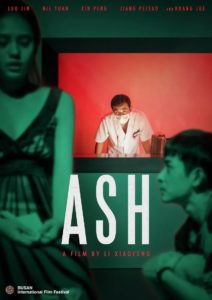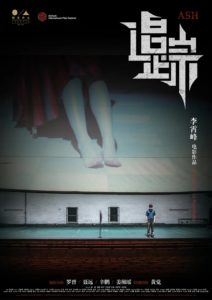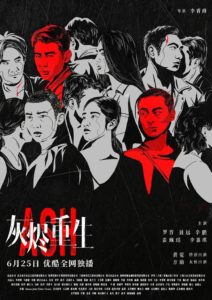Ash
灰烬重生
China, 2017, colour, 1.85:1, 113 mins. (premiere version), 95 mins. (release version).
Director: Li Xiaofeng 李霄峰.
Rating: 7/10.
Impressively mounted psychodrama is flawed by an unconvincing, weakly structured screenplay.
Sicheng city, Chongqing municipality, central China, 28 Jul, c. mid-1990s. A middle-aged man, Ma Xudong (Yang Yiwei), is found with his throat cut in a cinema; he was killed during the afternoon. Police detective Chen Weikun (Nie Yuan) comes to suspect the man’s 20-year-old step-son, steelyard worker Xu Feng (Xin Peng), who admits he wished him dead. A former cook, Ma Xudong was often drunk and bullied both Xu Feng and his mother, Xu Liqing (Liu Lu). Chen Weikun follows Xu Feng around but the case remains unsolved. Ten years later, Chen Weikun attends the wedding of his former police colleague, Zhang Liang (Sun Hao), who left the force to go into business. Chen Weikun’s wife, Wenwen (Shi Ce), arrives late, drunk from entertaining business clients, and the couple argue. One day, while out with Zhang Liang, Chen Weikun sees a masked man in a jewellery shop who reminds him of a masked man he briefly saw outside the cinema 10 years ago. Zhang Liang says he is Wang Dong (Luo Jin), a respected doctor at the local No. 2 Hospital who’s married to Wu Xuanhui (Jiang Peiyao), the daughter of the hospital’s former head. (Ten years ago Xu Feng had bought a Chinese translation of Leo Tolstoy’s 1899 novel Resurrection at a second-hand bookstall. On the flyleaf he had found a note, “Why does Maslova fall in love with Nekhlyudov?”, written by Wang Dong, with his address at Sicheng Medical College. Intrigued, Xu Feng had written to him and the two had become pen-pals. At college, Wang Dong had held a torch for student dancer Wu Xuanhui, but she had just used him to do her homework; she’d actually been romancing an older, rich man, Du Guojin [Huang Jue], who was aware of Wang Dong’s crush on Wu Xuanhui but told him he didn’t care. One day Wang Dong had found Wu Xuanhui in tears, for an unexplained reason.) Chen Weikun visits Wu Xuanhui’s father (Lin Jinfeng), who has early Alzheimer’s, and unsuccessfully tries to get him to remember Du Guojin, who had been murdered 10 years ago and the case never never solved. He also questions Du Guojin’s father, Du Mingyi (Fang Li), who’s in prison for corruption, about Wu Xuanhui, but learns nothing. (Du Guojin, who had raped Wu Xuanhui and made her pregnant, had humiliated Wang Dong by giving him money to pay for all of Wu Xuanhui’s medical bills, as he wanted nothing more to do with her. Wang Dong had suffered the humiliation, as he was liked by Wu Xuanhui’s father, who recognised his talent and ambition. One day Wang Dong had finally suggested to pen-pal Xu Feng that they should meet in person. At the meeting he’d suggested that each should murder the other’s enemy, especially as they themselves had done nothing to deserve such treatment. So Xu Feng had befriended and then killed Du Guojin at a deserted lake, and Wang Dong had slit Ma Xudong’s throat in a cinema one afternoon. However, racked by guilt, Xu Feng had left Sicheng, moved to Jiangcheng, started drinking, and accidentally caused a girl, dancer Yu Yingying [Li Jiaqi], to fall off a nightclub stage and cripple herself.) Chen Weikun still doggedly pursues the case, though without any hard evidence. One day Wu Xuanhui, who is a regular client of the flower shop that the married Yu Yingying and Xu Feng run together, asks Yu Yingying how and when she and Xu Feng first met. Later, still overburdened by guilt, Xu Feng meets Wang Dong face to face after many years and proposes they should give themselves up.
REVIEW
 More than two-and-a-half years after its festival premiere (see poster, left), Mainland crime drama Ash 灰烬重生 was finally released (online) in China this June. Almost 20 minutes shorter, completely re-edited, and with a new Chinese title and extra material shot in 2018, this version is considered by its director, Li Xiaofeng 李霄峰, to be a new film – though it still carries the original’s 2017 longbiao (release certificate). However one chooses to look at it, Ash is a visually striking psychodrama that’s more impressive during the watching than in the aftermath and, though unlikely to have made any waves at the box office, is still a big step up after Li’s debut feature, Nezha 少女哪吒 (2014), a shakily constructed tale of female friendship. Li’s third feature, crime drama Back to the Wharf 风平浪静, also centred like Ash on redemption for a past wrongdoing, premiered at the Shanghai festival in late July.
More than two-and-a-half years after its festival premiere (see poster, left), Mainland crime drama Ash 灰烬重生 was finally released (online) in China this June. Almost 20 minutes shorter, completely re-edited, and with a new Chinese title and extra material shot in 2018, this version is considered by its director, Li Xiaofeng 李霄峰, to be a new film – though it still carries the original’s 2017 longbiao (release certificate). However one chooses to look at it, Ash is a visually striking psychodrama that’s more impressive during the watching than in the aftermath and, though unlikely to have made any waves at the box office, is still a big step up after Li’s debut feature, Nezha 少女哪吒 (2014), a shakily constructed tale of female friendship. Li’s third feature, crime drama Back to the Wharf 风平浪静, also centred like Ash on redemption for a past wrongdoing, premiered at the Shanghai festival in late July.
Though it’s common for films to be re-edited – often for the shorter and the better – after festival premieres, Ash appears to have been re-worked more extensively than is usual. Though the extra material is not specified, Li describes the movie’s overall tempo as being tighter now – perhaps a little too much, as the plot, though never linear in the first place, is sometimes barely comprehensible and has large gaps that beg to be filled. And though the film is more a metaphysical drama of guilt and salvation than a straightforward whodunit, it still requires a large leap of faith by the viewer to accept its coincidences and implausibilities – a common weakness of Chinese crime dramas, whether noir or not. As in Nezha, the striking imagery of Dutch-Chinese d.p. Joewi Verhoeven 中伟 manages to paper over these faults during actual viewing.
Opening sometime in the 1990s, with a body found in an old-style cinema, the plot initially looks like a straight whodunit, with the detective suspecting the step-son of the abusive victim. Ten minutes later, with the case unsolved, the plot then leaps ahead 10 years, with a particularly unlikely development: the detective recognises a man with a face mask whom he saw briefly in the dark loitering outside the cinema and also wearing a face mask. The only problem is that the man is a respected doctor at a local hospital, and almost above suspicion.
The sheer unlikelihood of recognising someone from a decade ago, wearing a mask in a crowd at night, is a big stumbling block so early in the movie. The same goes for the first of several flashbacks, in which the step-son, a steelyard worker, happens to pick up a second-hand copy of Tolstoy’s novel Resurrection that was previously owned by the doctor when a student. The script’s basic idea of two people from different walks of life being complicit in murder is fine, but its set-up (and later psychological development) is both unlikely and not very convincing.
Poor script structure was at the heart of Nezha‘s faults and so it is here, with confusing gaps in the narrative as it flashes backwards and forwards, characters introduced and then lying undeveloped by the wayside (the step-son’s mother, the detective’s wife), an obsessive detective who has nothing to go on except instinct, and the central relationship between the step-son and the doctor not convincingly enough drawn to carry the weight of the central concept. Milling around in the middle is the character of the doctor’s wife – whom he carried a torch for when they were both students and she ignored him in favour of an older skirt-chaser – but, again, the role is not strongly enough written to work as an emotional pivot. Of the three co-writers, Xu Zhanxiong 徐展雄 is a director in his own right (Wild Grass 荞麦疯长, 2020) who worked on the TVD Evil Minds 心理罪 (2015), while Wang Mu 王沐 was a co-writer on Nezha; veteran screenwriter/novelist Gu Xiaobai 顾小白 (crime dramas People Mountain People Sea 人山人海, 2011, The Witness 我是证人, 2015, and Evil Minds) is credited as a script advisor.
As with Nezha, d.p. Verhoeven is the real star, with expressive night photography, occasional use of colour saturation, and some striking set-ups managing to suspend disbelief temporarily and let atmosphere carry the movie. The equally atmospheric score-cum-sound effects by British musician Simon Fisher Turner (The Last of England, 1987; Nadja, 1994) is also a big help. Li, then 39, certainly knew how to stage and cut individual sequences (the double murders, for instance), but there’s a feeling throughout Ash that he was reaching for big themes beyond his current grasp as a film-maker.
Performances, especially in the supporting roles, are strong, with young actress Li Jiaqi 李嘉琪 (the rebellious title character in Nezha) making a lot from a little as the step-son’s devoted wife, and the experienced Huang Jue 黄觉 briefly dominating the screen as a wealthy skirt-chaser. As the taciturn step-son, Xin Peng 辛鹏 (the martial-arts student in Nezha) is suitably tightly-wound but a tad over-enigmatic; as the ambitious doctor, TV’s Luo Jin 罗晋 (the regional governor in Xuan Zang 大唐玄奘, 2016) just about manages to sustain the main role, with a focused intensity. Second-billed Nie Yuan 聂远 (the impressive secret-police chief in Brotherhood of Blades 绣春刀, 2014) is fine as the detective, despite playing a role that’s driven by no hard evidence, while Jiang Peiyao 姜珮瑶, 23, then at the start of her big-screen career, gives a good showing as the doctor’s wife.
 The Chinese title of the premiere version was 追•踪 (literally, “Chase, Trace”, see poster, left). The current Chinese title means “Resurrected from the Ashes” or “Ashes Reborn”. A previous English title for the film was Tracing.
The Chinese title of the premiere version was 追•踪 (literally, “Chase, Trace”, see poster, left). The current Chinese title means “Resurrected from the Ashes” or “Ashes Reborn”. A previous English title for the film was Tracing.
CREDITS
Presented by Beijing BHBD Cultural Diffusion (CN), Shenzhen GTS Investment Management (CN), Shanghai Alibaba Pictures (CN). Produced by Beijing BHBD Cultural Diffusion (CN), Shanghai Dashui Cultural Development (CN).
Script: Xu Zhanxiong, Shen Yi, Wang Mu, Li Xiaofeng. On-set script: Zhao Yang. Script advice: Gu Xiaobai, Gu Zheng. Photography: Joewi Verhoeven. Editing: Liu Yueyue, Teng Yun, Ham Seong-weon. Music: Simon Fisher Turner. Art direction: Wang Zhiqing, Hao Yongfeng. Styling: Tan Ying. Sound: Lu Ke, Wang Gang. Visual effects: Huang Yunfeng, Liu Shiyang. Executive direction: Wang Weilin. Artistic advice: Chen Chuanxing.
Cast: Luo Jin (Wang Dong), Nie Yuan (Chen Weikun), Xin Peng (Xu Feng), Jiang Peiyao (Wu Xuanhui), Li Jiaqi (Yu Yingying, Xu Feng’s wife), Huang Jue (Du Guojin), Fang Li (Du Mingyi, Du Guojin’s father), Liu Lu (Xu Liqing, Xu Feng’s mother), Yang Yiwei (Ma Xudong, Xu Feng’s step-father), Sun Hao (Zhang Liang), Shi Ce (Wenwen, Chen Weikun’s wife), Lin Jinfeng (Wu Xuanhui’s father), Nie Juntong (Huanhuan), Ou Ning (Liu Lianghan), Yu Shuang (Zhang Liang’s wife), Zhan Bin (Li, police captain), Sun Shuo (forensic pathologist), Li Chuanchuan (police archivist), Li Jianli (auntie), Li Xiaofeng (bar owner), Lou Yijian (nurse), Gao Xudong (patient).
Premiere: Busan Film Festival (A Window on Asian Cinema), 14 Oct 2017.
Release: China, 25 Jun 2020 (online).
